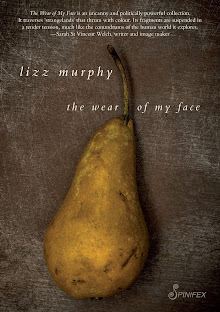The theme is Beginnings. In her foreword, editor Bronwyn Lea ponders the question of beginnings. The poems beg the same questions of the reader. What is a beginning? Where does a poem begin? How many guises? Is the beginning: ‘Life like a dirty wind …’ (Via Negativa: The Divine Darkness by Robert Adamson p.4); the ‘dance binding sunlight to bird’ (The by Cameron Lowe p.39); the One Broken Knife (Carmen Leigh Keates p. 29)?
One Broken Knife is one of the poems that interest me the most: the attachment to objects, the extra usage they gain after defect. The object as story: passion, possession, grief; the extra story, the new story – ‘… when the point is broken/and it attains that animalistic/pig-angry bearing …’ The detachment from body: ‘looking at your hands going about their thing …’. The employ she ascribes them: ‘Your hands are farmers.’ Existence … and the new life.
River Fisher by Sarah Day (p.19) is a poem of possibilities. Half a dozen lives might exist in these fourteen lines already (suddenly compact amid so many longer selections). Life goes on against the ‘push and shove’ and from that potential blow of eggs - how many more beginnings - but watch out for the slippery stone, which may change the course entirely.
Sarah Holland-Batt’s description of The Vulture - that ‘high priest of the day’s death march’ - is a knee-sinker: ‘A reptilian meanness in the face:/raw pink skin rolled on the skull …’ Beginnings chronicled in his ‘nightmare music’, his ‘sword-swallowing’ menu of the day and the feeling that you might be the corpse the vulture hoists itself out of or maybe its awkward wing in turbulence.
Other poems to mention include: Paul Hetherington’s A Norse Greenlander, 1450, Jill Jones’ Afternoon Grey In, Misbah Khokar’s Soldiers Near the Khyber Pass, Les Murray’s Floodtime Night Shelter, Ron Pretty’s Montaigne, Tracy Ryan’s Reflection.
The book itself is well designed, though grey and classic. There’s a range of style but room for more diversity – this may reflect the submissions rather than an editor’s choice. Gender range: 25 males, 18 females, published (ouch); 4 males mentioned on back cover, 1 female (ouch, ouch). Seventeen of the total 43 are new and developing poets; a bit of a geographical spread. I support the inclusion of international poets – we can’t live in an antipodean bubble and must promote dialogue between hemispheres, continents; other poetry lands and cultures. Another reason why I like the Bök poem discussed in my previous post.













No comments:
Post a Comment